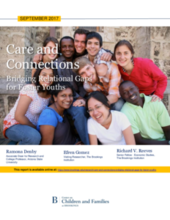Executive Summary
Young people leaving foster care face a number of disadvantages, ranging from low levels of education and employment, a high prevalence of mental health disorders, involvement in the juvenile justice, and high teen pregnancy rates. Significant efforts are made by policymakers at all levels to improve educational, social and economic outcomes for this at-risk group, but with mixed results.
Research suggests that healthy and supportive relationships improve life chances for foster youth. But so far there have been relatively few attempts to build these insights into programs and practice. In 2011, the Administration for Children and Families, Children’s Bureau, funded four projects in different parts of the United States. Each provided services to help foster youths build and use relational skills in order to develop healthy and safe connections with others, and so improve their outcomes, including emotional well-being, permanency, occupational attainment, and educational attainment.
Even though preliminary findings from the project revealed mixed results, some projects found promising outcomes (i.e., increasing levels of connectedness reported by youths, increasing career readiness, and occupational attainment) that could be evaluated using more rigorous research methods. We explore the steep challenges of both implementing and evaluating relationship-based interventions in child welfare. We also present implications and recommendations for practitioners and researchers interested in increasing relational capacities for foster youths.

